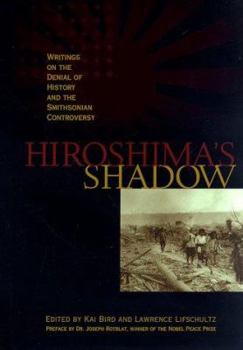Hiroshima's Shadow: Writings on the Denial of History and the Smithsonian Controversy
Select Format
Select Condition 
Book Overview
Delayed in order to include contributions by Joseph Rotblat and Kenzaburo Oe, two recent Nobel Peace Prize winners, and the haunting photographs of Yosuke Yamahata, as well as a completely new cover... This description may be from another edition of this product.
Format:Hardcover
Language:English
ISBN:0963058738
ISBN13:9780963058737
Release Date:May 1998
Publisher:Pamphleteer's Press
Length:584 Pages
Weight:2.95 lbs.
Dimensions:1.8" x 7.4" x 10.3"
Related Subjects
HistoryCustomer Reviews
3 ratings
Hiroshima's Shadows presents voices from all sides
Published by Thriftbooks.com User , 26 years ago
Here is an extract from my review of 'Hiroshima's Shadows', that appeared in 'New Politics', no. 25 (Summer 1998):'Hiroshima's Shadow: Writings on the Denial of History and the Smithsonian Controversy' is an enormous, and aesthetically handsome work, bringing together nearly 50 essays between between 1945 and 1997 by scholars, military, political and religious leaders, independent intellectuals, and survivors of the atomic bombings. The book is unusual in that, though it has a strong editorial point of view, the editors unflinchingly present voices from all sides of the argument. The contribors include Albert Camus, Dwight Macdonald, Lewis Mumford, Mary McCarthy, A.J. Muste, among others. Defenders of the bomb include Charles Krauthammer who says that we should "let the Japanese commemorate the catastrophe they brought on themselves" (rather than mourn the use of the bomb), and Paul Fussel, an English professor and ex-front line combatant, who raises the slogan, "thank god for the atomic bomb." An even wider range of ideological positions is represented on the side of the critics: Lifschultz and Bird have recovered an anti-bomb editorial from the paleo-right-wing 'Human Events' and placed it alongside the observations of Mahatma Gandhi and Norman Thomas. As the editors put it, "the usual distinctions of left and right on economic and social issues were not reliable guides which could accurately predict what people thought about Hiroshima."A substantial section of the book contains memoirs of a few survivors. These memoirs underscore the enduring reality that it was civilians, not military objectives, who were then, and remain, the prime target of nuclear weapons.
Hiroshima's Shadows presents voices from all sides
Published by Thriftbooks.com User , 26 years ago
Here is an extract from my review of 'Hiroshima's Shadows', that appeared in 'New Politics', no. 25 (Summer 1998):'Hiroshima's Shadow: Writings on the Denial of History and the Smithsonian Controversy' is an enormous, and aesthetically handsome work, bringing together nearly 50 essays between between 1945 and 1997 by scholars, military, political and religious leaders, independent intellectuals, and survivors of the atomic bombings. The book is unusual in that, though it has a strong editorial point of view, the editors unflinchingly present voices from all sides of the argument. The contribors include Albert Camus, Dwight Macdonald, Lewis Mumford, Mary McCarthy, A.J. Muste, among others. Defenders of the bomb include Charles Krauthammer who says that we should "let the Japanese commemorate the catastrophe they brought on themselves" (rather than mourn the use of the bomb), and Paul Fussel, an English professor and ex-front line combatant, who raises the slogan, "thank god for the atomic bomb." An even wider range of ideological positions is represented on the side of the critics: Lifschultz and Bird have recovered an anti-bomb editorial from the paleo-right-wing 'Human Events' and placed it alongside the observations of Mahatma Gandhi and Norman Thomas. As the editors put it, "the usual distinctions of left and right on economic and social issues were not reliable guides which could accurately predt what people thought about Hiroshima."A substantial section of the book contains memoirs of a few survivors. These memoirs underscore the enduring reality that it was civilians, not military objectives, who were then, and remain, the prime target of nuclear weapons.
The most comprehensive and balanced account to date.
Published by Thriftbooks.com User , 26 years ago
Hiroshima's Shadow is perhaps the most comprehensive and balanced collection of essays to date on the decision to use atomic bombs against Hiroshima and Nagasaki. While some insist on a single interpretation of these events and label any reinterpretation as unpatriotic or unAmerican, the New York Times put it best: "The real betrayal of American tradition would be to insist on a single version of history or to make it the property of the state or any group. History in America is based on freedom of inquiry and discussion, which is one reason why Americans have given their lives to defend it."





